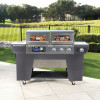Cuisinart GAS0356AS User Manual - Page 28
Transporting And Storage
 |
View all Cuisinart GAS0356AS manuals
Add to My Manuals
Save this manual to your list of manuals |
Page 28 highlights
TRANSPORTING AND STORAGE: WARNING • Never move a grill when hot or in use. • Make sure that cylinder valve is closed and burner knobs are in the off position. • DO NOT store a spare LP gas cylinder (filled or empty) under or near the grill. • Never store flammable liquids or spray canisters under or near the grill. • If the outdoor cooking gas appliance is not in use, the gas must be turned off at the LP gas supply cylinder. • Storage of an outdoor cooking gas appliance indoors is permissible only if the cylinder is disconnected and removed from the outdoor cooking gas appliance. • Cylinders must not be stored in a building or enclosure, including garages and sheds. • Cylinders must be kept out of reach of children. BEFORE STORING YOUR GRILL: • Ensure that the cylinder valve is fully closed. • Clean all surfaces. Lightly coat the burners with cooking oil to prevent excess rusting. • If storing the grill indoors, disconnect the LP tank and leave the LP tank OUTDOORS. • Place dust cap on cylinder valve outlet whenever the cylinder is not in use. Only install the type of dust cap on the cylinder valve outlet that is provided with the cylinder valve. Other types of caps or plugs may result in leakage of propane. • Check and clean burner prior to use after storing, at the beginning of grilling season or after a period of not being used. Spiders and insects like to build nests in burner tubes (especially during colder months). Blocked burner tubes can prevent gas flow to the burners and could result in a burner tube fire or fire beneath the grill. See "Burner Assembly/Maintenance" under Proper Care and Maintenance. • If storing the grill outdoors, cover the grill with a grill cover for protection from the weather. • If storing the grill outdoors, close the wood pellet lid and cover the grill with a cover for protection from the weather. • If the grill is stored outside during the rainy season, care should be taken to ensure that water does not get into the pellet hopper. Wood pellets, when wet, expand greatly and will jam your auger. 27














